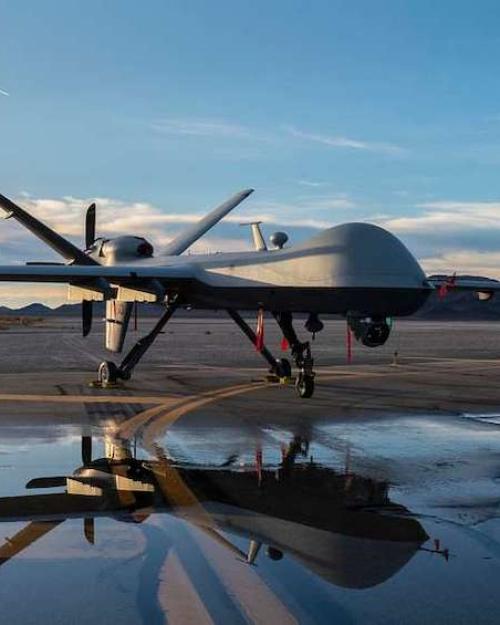Armed drones are neither a “magic bullet” that wins wars nor an inconsequential tool with little impact on the battlefield, according to two Cornell University scholars.
In a March 15 article in the journal Defense & Security Analysis, Sarah Kreps and Paul Lushenko dissect an ongoing debate among military and technology experts about the importance of drones on the modern battlefield. Kreps is the John L. Wetherill Professor in the Department of Government in the College of Arts and Sciences (A&S), director of the Cornell Jeb E. Brooks School Tech Policy Institute and adjunct professor of law. Lushenko is a U.S. Army lieutenant colonel and deputy director of the Tech Policy Institute. After graduating in May with a doctorate from the Department of Government, he will teach at the U.S. Army War College.
The debate over drones has been given new urgency by the war in Ukraine where both sides have deployed the unmanned systems. Ukraine has had noted success with drones, destroying a guided missile cruiser, surface-to-air missiles, and targets behind enemy lines and inside Russia’s borders.
“Some experts argue that drones have irrevocably altered war, and even claim that drones threaten to undermine the liberal international order,” Kreps and Lushenko write. Other scholars, pointing to the vulnerability of drones to air defenses, imply they do little to shift the balance of power between countries on the battlefield, which can shape overall war outcomes.
The reality, Kreps and Lushenko argue, is at neither extreme. They cite examples from recent conflicts to advance three points.
First, military innovations can be significant even if they do not dramatically alter global politics. In 2019, Iranian-backed Houthis used drones to attack oil fields in Saudi Arabia. Then U.S. Secretary of State Mike Pompeo called it “an unprecedented attack on the world’s energy supply.”
Secondly, evidence suggesting that drones can end wars on their own accord is problematic. Ukraine has used drones to frustrate Russia’s war aims but the occupation continues and many drones, including the well-known TB2 Bayraktar manufactured and proliferated by Turkey, have been shot down. They’ve been effective in destroying tanks and reducing casualties but are not, by themselves, a path to peace.
Finally, drones may be susceptible to air defense systems but that’s not dissuading countries from acquiring them and flying them into action. Russian President Vladimir Putin has sought to match Ukraine’s drone successes. That “signals his belief that drones have been so effective against his forces, that he must also use them to re-level the playing field against Ukraine or risk a strategic defeat,” Kreps and Lushenko contend.
That point-counterpoint approach underscores what Kreps and Lushenko term their “middle-ground between two extreme positions.” Drones don’t produce revolutionary effects but they’re not going away. “Drones have had important impacts in some conflicts and are here to stay for political, if not military and social-psychological reasons,” Kreps and Lushenko conclude.
Jim Hanchett is assistant dean of communications for the Cornell Jeb E. Brooks School of Public Policy.





